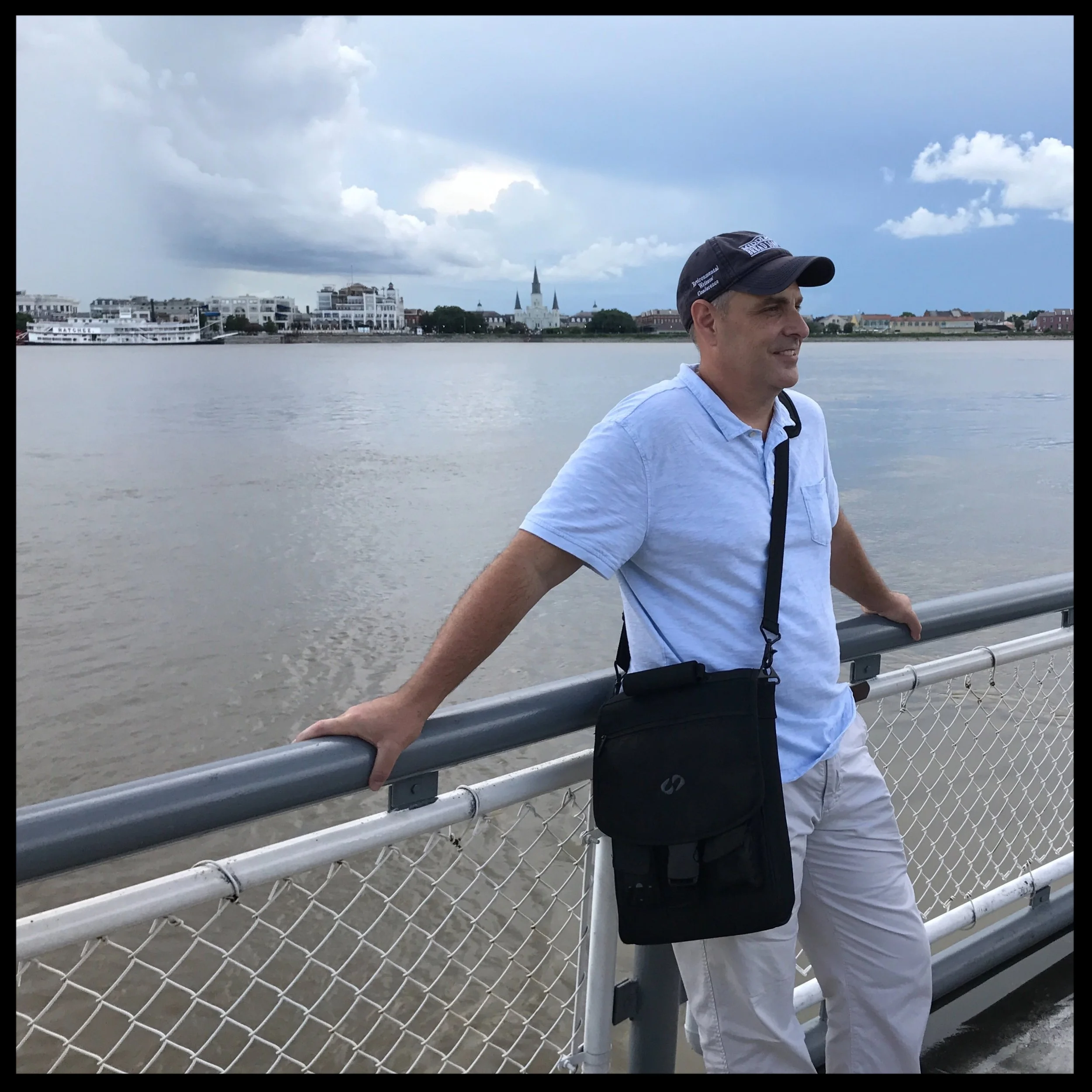AN INTERVIEW WITH JACK B. BEDELL
What was the first poem (or piece of writing) that you wrote that you were really proud of, that made you happy and so fully satisfied to have written it? Why?
Jack Bedell crossing the Mississippi River on the ferry to New Orleans during the New Orleans Writing Marathon. One of his favorite places to write.
I started writing poems during my senior year of college when I signed up for a creative writing course to fill out my schedule. Without having read much poetry beyond the Romantics, I spent a lot of time in that class building a stack of William Blake on the Bayou poems, wrenching whatever new thing I’d learned in philosophy class into the verse. My teacher at the time was kind enough to pull me out in the hall to tell me how awful it all was, but he also told me it didn’t have to stay that way. He gave me a book of contemporary poetry, The Drive-In by R.S. Gwynn. That book was an instant education in narrative poetry of place and of craft for me. The first poem I wrote after reading Gwynn was a piece called “What You Think of the Out-There at Twenty When You Can’t See Yourself in Forty Years.” It was the first time I’d ever written about my actual family and my real home. The feeling of satisfaction and pride from honoring the close at hand in that poem is the exact feeling that drives to me to write to this day.
Is there a single image that lingers in your poetry (or in your mind as you write), one that perhaps you keep returning to in however many variations?
A half dozen times over the past three years I’ve had a big, dark catfish rise up from the silt in my poems. I’m not sure if it’s fear of the unknown, mortality issues, or just a giant fish popping up in my work, but it’s an image I can’t seem to shake.
Do you have any necessities of place/setting when it comes to your writing process? For instance, do you require music, silence, the bustle of a busy coffee shop? Windows open or windows closed? Favorite beverage?
When my children were really young, I used to crave the stillness of an early morning house to get work done. Nowadays, though, I need partners more than anything else. Working with another writer gets me going on days when I have too many excuses. If I know another person is counting on me to put out effort and give attention to their work, it fuels me to get busy. I’ve been more productive the last couple of years than I’ve ever been in my life, and it’s all thanks to the generosity of other writers who’ve shared time, energy, and space with me to do the work.
What is your favorite body of water?
Growing up, I spent a good bit of time on Bayou DeCade back home in Terrebonne Parish. My uncle, Ray Rougeau, had a camp on the bayou right off the lake, and he brought my brother and me out there whenever he had the time. I would be lying if I said it was a beautiful place, but much of what I know about beauty I learned there.
What small wonder makes your heart leap with joy?
I love the spark I see in my children’s eyes when they know I’m not telling them the whole truth. It lets me know they won’t be fooled easily, no matter what the world throws at them.
What words of wisdom or writerly advice would you like to share with our readers?
Reading is an excellent source of education and inspiration for writers, but it is not the only one. Music, dance, conversation, relationships, camping, hiking, meditation—in short, engaging life in any significant way—are all excellent sources for poetry. Be present in the community of life. Art will flow from that engagement.
This next question is from our last Photic Zone participant, Carol Alexander. She asks, "Where do you think environmental literature is headed these days, and how does the present environmental situation shape that direction?"
I really believe there’s an urgency to today’s environmental situation compelling writers to move beyond appreciation, inventory, and recognition of nature towards a conservation and regeneration in our work. With all of the information being gathered these days, it’s clear to me that now is the time to act if we want to save the health of the planet. More than anything, environmental literature creates a community of action and fosters the hope that it’s not too late to make positive changes. In fact, it’s exactly the time to do so. I really hope environmental literature is evolving from a call to action into an action plan for all of us.
Jack B. Bedell is Professor of English and Coordinator of Creative Writing at Southeastern Louisiana University where he also edits Louisiana Literature and directs the Louisiana Literature Press. His latest collections are Elliptic (Yellow Flag Press), Revenant (Blue Horse Press), and No Brother, This Storm (Mercer University Press, 2018). He has recently been appointed by Governor John Bel Edwards to serve as Louisiana Poet Laureate 2017-2019.

